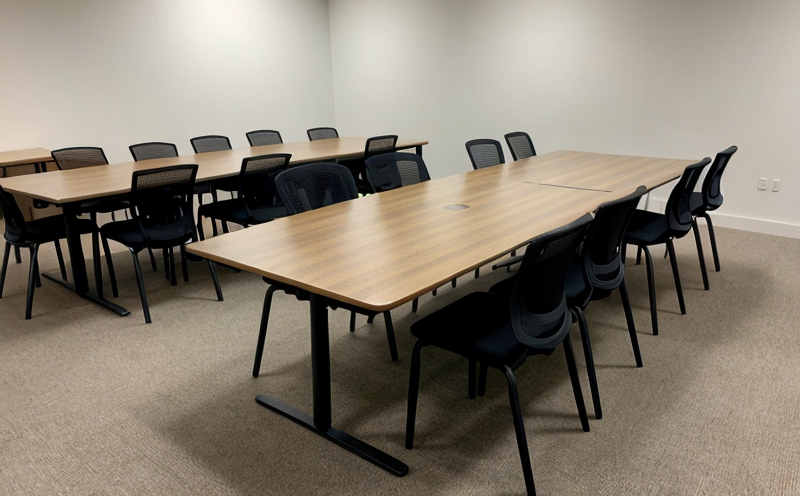IEC 61010 Safety Testing of Laboratory Work Tables with Electrical Components
The International Electrotechnical Commission (IEC) standard IEC 61010 sets forth stringent safety requirements for electrical equipment used in testing and calibration laboratories. This standard is crucial for ensuring the safe operation of laboratory work tables that incorporate electrical components, such as those designed for use by R&D engineers and quality managers.
Compliance with IEC 61010 ensures that these worktables are free from hazards that could endanger personnel or compromise test reliability. The standard covers not only the design and construction of the worktable but also its electrical integrity, which includes insulation resistance, protection against overvoltage, and protection against electric shock.
The testing process involves several key components to ensure compliance:
- Insulation Resistance Testing: This checks that the insulating materials used in the table are capable of withstanding high voltages without breakdown. This is critical for maintaining safe working conditions.
- Overvoltage Protection: Ensuring that overvoltage events do not cause damage to the worktable or pose a risk to users.
- Protection Against Electric Shock: Verification that there are no exposed conductive parts that could lead to electric shock during operation.
The test parameters and specimen preparation involve simulating real-world conditions under which these tables will be used. This includes applying specified voltages, measuring insulation resistance, and assessing the performance of protective circuits. The use of high-quality instruments, such as megohmmeters for insulation testing, is essential to ensure accurate and reliable results.
The acceptance criteria are based on international standards like IEC 61010-2-4, which specifies the requirements for electrical equipment used in laboratories. Compliance with these standards ensures that the worktables meet stringent safety requirements, thereby enhancing the reliability of tests conducted within those environments.
Why It Matters
Compliance with IEC 61010 is not just a regulatory requirement but also a critical factor in ensuring workplace safety and maintaining the integrity of laboratory testing. Non-compliance can lead to serious accidents, injuries, or even fatalities involving personnel working in laboratories. Moreover, it can result in product recalls, reputational damage, and legal challenges.
From an operational perspective, compliance with these standards helps prevent equipment failures that could disrupt workflows and affect the accuracy of test results. For R&D engineers and quality managers, ensuring safety is paramount to protect their teams and maintain the credibility of their research and testing outputs.
The importance of IEC 61010 in the furniture testing sector extends beyond mere compliance; it sets a benchmark for excellence in laboratory design and operation. By adhering to these standards, laboratories can demonstrate their commitment to safety, which is increasingly valued by clients and stakeholders alike.
Customer Impact and Satisfaction
Customers of IEC 61010-compliant worktables benefit from several key advantages:
- Safety Assurance: Customers gain peace of mind knowing that the worktables they purchase meet stringent safety standards, which is particularly important for institutions or enterprises where compliance with regulations and industry best practices is critical.
- Risk Mitigation: By using IEC 61010-compliant tables, customers can mitigate risks associated with electrical hazards in laboratory settings. This reduces the likelihood of accidents and ensures a safer work environment for all users.
- Enhanced Reputation: Compliance with international standards enhances the reputation of both the purchasing entity and the supplier. It demonstrates commitment to quality and safety, which is increasingly important in competitive markets.
In summary, compliance with IEC 61010 not only protects personnel but also supports customer satisfaction by ensuring that worktables are reliable and safe for use in demanding laboratory environments.
Competitive Advantage and Market Impact
- Differentiation: By offering IEC 61010-compliant laboratory work tables, a company can differentiate itself from competitors by providing superior safety features. This is particularly important in sectors where regulatory compliance is critical.
- Innovation: Adhering to these standards encourages continuous improvement and innovation in the design and functionality of laboratory furniture. This can lead to more efficient and safer working environments.
- Market Attraction: Compliance with international standards like IEC 61010 enhances a company's appeal to potential clients, especially those in industries where safety is paramount.
- Regulatory Compliance: By ensuring compliance with these standards, companies can avoid legal and financial penalties associated with non-compliance. This fosters long-term sustainability and growth.
In the competitive landscape of laboratory furniture, IEC 61010 compliance is a key differentiator that enables companies to stand out and attract more business opportunities.





